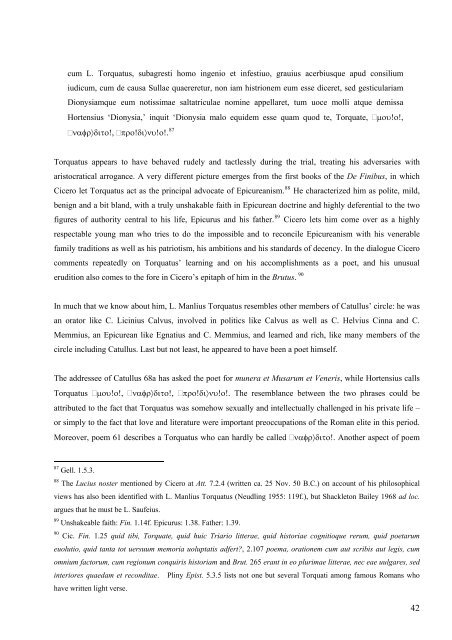CATULLUS 68 - Scuola Normale Superiore
CATULLUS 68 - Scuola Normale Superiore
CATULLUS 68 - Scuola Normale Superiore
You also want an ePaper? Increase the reach of your titles
YUMPU automatically turns print PDFs into web optimized ePapers that Google loves.
cum L. Torquatus, subagresti homo ingenio et infestiuo, grauius acerbiusque apud consilium<br />
iudicum, cum de causa Sullae quaereretur, non iam histrionem eum esse diceret, sed gesticulariam<br />
Dionysiamque eum notissimae saltatriculae nomine appellaret, tum uoce molli atque demissa<br />
Hortensius ‘Dionysia,’ inquit ‘Dionysia malo equidem esse quam quod te, Torquate, μου!ο!,<br />
ναφρ〉διτο!, προ!δι〉νυ!ο!. 87<br />
Torquatus appears to have behaved rudely and tactlessly during the trial, treating his adversaries with<br />
aristocratical arrogance. A very different picture emerges from the first books of the De Finibus, in which<br />
Cicero let Torquatus act as the principal advocate of Epicureanism. 88 He characterized him as polite, mild,<br />
benign and a bit bland, with a truly unshakable faith in Epicurean doctrine and highly deferential to the two<br />
figures of authority central to his life, Epicurus and his father. 89 Cicero lets him come over as a highly<br />
respectable young man who tries to do the impossible and to reconcile Epicureanism with his venerable<br />
family traditions as well as his patriotism, his ambitions and his standards of decency. In the dialogue Cicero<br />
comments repeatedly on Torquatus’ learning and on his accomplishments as a poet, and his unusual<br />
erudition also comes to the fore in Cicero’s epitaph of him in the Brutus. 90<br />
In much that we know about him, L. Manlius Torquatus resembles other members of Catullus’ circle: he was<br />
an orator like C. Licinius Calvus, involved in politics like Calvus as well as C. Helvius Cinna and C.<br />
Memmius, an Epicurean like Egnatius and C. Memmius, and learned and rich, like many members of the<br />
circle including Catullus. Last but not least, he appeared to have been a poet himself.<br />
The addressee of Catullus <strong>68</strong>a has asked the poet for munera et Musarum et Veneris, while Hortensius calls<br />
Torquatus μου!ο!, ναφρ〉διτο!, προ!δι〉νυ!ο!. The resemblance between the two phrases could be<br />
attributed to the fact that Torquatus was somehow sexually and intellectually challenged in his private life –<br />
or simply to the fact that love and literature were important preoccupations of the Roman elite in this period.<br />
Moreover, poem 61 describes a Torquatus who can hardly be called ναφρ〉διτο!. Another aspect of poem<br />
87<br />
Gell. 1.5.3.<br />
88<br />
The Lucius noster mentioned by Cicero at Att. 7.2.4 (written ca. 25 Nov. 50 B.C.) on account of his philosophical<br />
views has also been identified with L. Manlius Torquatus (Neudling 1955: 119f.), but Shackleton Bailey 19<strong>68</strong> ad loc.<br />
argues that he must be L. Saufeius.<br />
89<br />
Unshakeable faith: Fin. 1.14f. Epicurus: 1.38. Father: 1.39.<br />
90<br />
Cic. Fin. 1.25 quid tibi, Torquate, quid huic Triario litterae, quid historiae cognitioque rerum, quid poetarum<br />
euolutio, quid tanta tot uersuum memoria uoluptatis adfert?, 2.107 poema, orationem cum aut scribis aut legis, cum<br />
omnium factorum, cum regionum conquiris historiam and Brut. 265 erant in eo plurimae litterae, nec eae uulgares, sed<br />
interiores quaedam et reconditae. Pliny Epist. 5.3.5 lists not one but several Torquati among famous Romans who<br />
have written light verse.<br />
42






